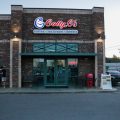5,338 miles. That’s the distance between us here at Austin Peay State University and Kyiv, Ukraine.
Physics professor Andriy Kovalskiy traveled that distance over Spring Break to help his wife, daughter and his three grandchildren get settled in a new home in Slovakia after they fled the growing war in Ukraine.
“They are OK. They have settled down. They have everything they need,” Kovalskiy said. “It’s a very challenging time, but they are safe and that’s all that matters.”
While he would very much like his family to be here, Ukraine is home for his family. His is wife and daughter hope to return to the Ukraine as soon as it is safe.
His daughter’s profession as a pediatrician in the Ukraine is also an important reason they have decided to stay behind. According to Kolvalskiy, those who classify as students, faculty and researchers are seen as the future of Ukraine.
There are no students or professors fighting in the Ukrainian Army unless they themselves volunteer to go and fight. Unlike other countries, such as China, who pull all those able to fight, the students and professors are non-deployable.
Lviv, where Kolvalskiy received his education, has been heavily under fire since Russian forces invaded on Feb. 24. Missiles have destroyed an aircraft repair plant, have come close to striking an airport and recently have hit a military base where 35 people were killed and more than 130 people were wounded.
Russia said it is not an invasion or a war- it’s only a “special military operation”. Kovalskiy disagrees. “It’s Russian propaganda”, said Kovalskiy. “People in Kyiv are dying. You can name it as you want, but it doesn’t mean nothing. I strongly believe that it’s a time where Europe got a new Hitler.
This was not the first time that Russia has attacked a country under the basis of it being a “special military operation”. In August of 1968, Russia occupied Czechoslovakia to crack down on the reformist trends in Prague. Kolvaskiy was just a small child when it happened, but he remembers how different both invasions are.
“There was no active fighting. There were casualties because of the protests, but it was not a fight. It was not a military operation like you think. In Ukraine, we have a real war. It’s not an operation or conflict, it’s a war.”
Kovalskiy was born in 1961 and raised in the small city if Drohobych, which is in Western Ukraine. He attended Ivan Franko National University where he received his bachelors and masters degrees in radioelectronic materials engineering and a doctorate in solid state physics.
In 2004, he was invited to Lehigh University in Bethlehem, Pennsylvania to work on a project in non-oxide amorphous materials. In 2011, he joined the department of physics faculty at APSU and in 2013 he was presented the university’s Richard M. Hawkins Award. The Hawkins Award is awarded annually to a faculty member who demonstrates exceptional scholarly and creative behavior.
In 2010, he became a permanent resident of the U.S. through the Outstanding Researchers category and then became a full U.S. citizen in 2015. According to the Department of The Outstanding Researcher petition is a visa that allows professors, scientist and other scholars to file for permanent residence in the U.S.
President Biden has stated that he would love for the U.S. to welcome Ukraine refugees with open arms. Immigration policies will not allow this in the immediate future. The European Commissions have implemented temporary protection to the refugees that are fleeing from Ukraine into bordering European countries such as Romania, Hungary and Slovakia.
One thing that Kolvalskiy wants the people at APSU to know is that there was not one specific reason that caused this war. This is all about empire ambitions from the Russians.
The country of Ukraine needs aid. Kolvalskiy says that one of the most reliable sources to help is http://rocmaidan.org/.





